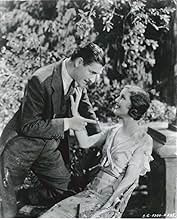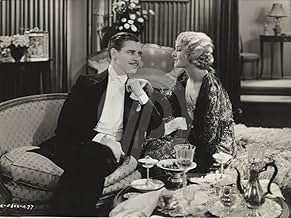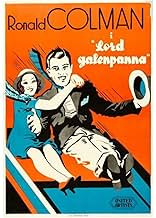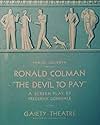अपनी भाषा में प्लॉट जोड़ेंSpendthrift Willie Leyland again returns to the family home in London penniless. His father is none too pleased but Willie smooth-talks him into letting him stay. At the same time, he turns ... सभी पढ़ेंSpendthrift Willie Leyland again returns to the family home in London penniless. His father is none too pleased but Willie smooth-talks him into letting him stay. At the same time, he turns the charm on Dorothy Hope, whose father is big in linoleum and who, before Willie's arriva... सभी पढ़ेंSpendthrift Willie Leyland again returns to the family home in London penniless. His father is none too pleased but Willie smooth-talks him into letting him stay. At the same time, he turns the charm on Dorothy Hope, whose father is big in linoleum and who, before Willie's arrival, was about to become engaged to a Russian aristocrat.
- पुरस्कार
- 2 जीत और कुल 1 नामांकन
- Arthur
- (as Crawford Kent)
- Bidder for Bed
- (बिना क्रेडिट के)
- Molly - Mary Crayle's Maid
- (बिना क्रेडिट के)
- Racing Fan at Derby
- (बिना क्रेडिट के)
- Mrs. Hope
- (बिना क्रेडिट के)
- Taxi Driver
- (बिना क्रेडिट के)
- Pet Shop Owner
- (बिना क्रेडिट के)
- Club Member
- (बिना क्रेडिट के)
- Butler
- (बिना क्रेडिट के)
- Lord Leland's Butler
- (बिना क्रेडिट के)
- Porter
- (बिना क्रेडिट के)
फ़ीचर्ड समीक्षाएं
Coleman plays Willie Hale, a 30ish playboy from a wealthy family who spends his time womanizing and gambling. Yet, he's a likable rogue - not only likable from the standpoint of the audience but by family and friends too. He has yet again gone broke due to his constant gambling and sells off his possessions in a foreign location to settle his debts and provide passage back home to England. When he gets there, he at first is met by a father who insists he'll kick him out - he's had it with Willie and his layabout ways. However, five minutes alone in a room with Willie and his charm, and Willie is not only forgiven by dad, dad has given him one hundred pounds to boot.
Willie then goes for a day's recreation with his sister and her friend, Dorothy Hope (Loretta Young). Dorothy is set to be engaged to the Grand Duke Paul that very night, mainly just because her dad wants royalty in the family, and there is nobody else special in her life. That changes after her day with Willie, and soon there is a scandal brewing as Dorothy refuses to go through with the marriage as planned.
Ronald Coleman is always a delight to watch in these early talking films he did for Sam Goldwyn where he is playing the confident adventurer or cad or both. He has a demeanor akin to Errol Flynn, but he is unable to display Flynn's physical agility due to a disabling wound he received during World War I. However, what he lacks in physical agility Coleman always made up in agility of soul. Loretta Young, only 17 when this picture was made, shows the beginning of her trademark sweet girl that can erupt into a ball of fire when the occasion calls for it. Myrna Loy plays Willie's girl from the past - Mary Crayle - a showgirl. Here Myrna is still playing a part similar to the exotic vamp parts she got stuck with so often over at Warner Brothers when she was a contract player from 1926 until shortly before this movie was made in 1930.
This is pretty much a light and breezy romantic comedy from start to finish. If you're in a mood for the kind of escapist entertainment that lightened the hearts of audiences during the Great Depression, this little film fits the bill.
But, the main character of the film, around whom the whole plot revolves, is the more well-known actor at the time, Ronald Colman. His career too began in the silent films. He was 26 when he made his first film in 1917, and he was a popular star by 1930. He had 30 films to his credit, some of which were silent classics. Colman was 22 years older than Young when this film was made - his 39 to her 17. But, besides being a standout talent already in her teens, Loretta Young was a girl who looked much more mature and older than her age - but just the right number of years.
While this is a good comedy, it has a feel of being somewhat disjointed. There are no apparent holes in the plot, but there's no stream that holds together the earliest scene of Willie Hale's (Colman) disposition of his property and goods in South Africa, and then his appearance back home after an absence of two years. Colman gives a nonchalant treatment to his character that is a trademark in his comedies. But, in this case, his wistfulness with his father, Lord Leland (played by Frederick Kerr) is so pronounced that it's hard to take him at all seriously. So, did he fear his father's reaction and treatment, or was that just nonsense?
The story has a nice ending - a type that should be familiar to fans of old black and white movies. There isn't any great acting in here, but Colman's presence is commanding in his scenes. That's most often because one is waiting for and expecting the next bit of comedy or witticism to come from him. Indeed, without the comedy in the dialog, this film wouldn't be much worth watching.
Fans of Colman, Young and Loy should enjoy this film, and others who like the older movies may be entertained by it. But modern audiences would probably struggle to sit through this film. Here are some favorite lines.
Willie Hale, to his father, Lord Leland, "Oh, come now. How could anything I do disgrace you?... Anything disgraceful that I may do merely gains for you an unfair sympathy from a sycophantic world."
Lord Leland, "Now...now you're blaming me for bringing you into the world!" Willie Hale, "Heh, heh, I should be extremely mortified for your sake if I had to blame anyone else."
Willie Hale, "Have you had a moment's boredom since I've been in the wrong? No! Your only trouble is, you have the father complex - 'Here's my son and he hasn't done any of the things I should like him to do and for that reason I should kick him out.'"
Mary, "I'd shoot anyone who tried to take you from me, Willie." Willie, "Are you a good shot?"
Lord Leland, "Well, then, what do you want to go to New Zealand for?" Willie Hale, "Because, if I ever want to go to Australia, I'll be near."
I like the way we're introduced to Willie's soft heart when he relents to buy eager mutt George from the pet store. Some such insight is needed since, aside from his antics, Willie's character is yet undefined. Producer Goldwyn had an obvious eye for up and comers like actresses Young and Loy who get the fashionable gowns, along with winning personalities and a shot at acting chops. Also, the production's well-upholstered befitting the background wealth. Then too, this is pre-Depression (1930) so the screenplay needn't worry about class issues that would soon prevail. Should also note the rotund Fred Kerr who plays Dorothy's dad like a really grouchy Winston Churchill-- I thought the physical resemblance striking. Anyway, it's an entertaining little flick that features an unusual character for a leading man, so give it a try since the sub-textual values cut across eras.
The film is well done, and the charm of Ronald Colman and Loretta Young makes the story a "must see".
क्या आपको पता है
- ट्रिवियाThe film's original director was Irving Cummings with Dorothy being played by Constance Cummings. After some scenes were shot, George Fitzmaurice replaced Cummings as director, and Loretta Young took over the role of Dorothy, with all previous scenes re-shot.
- गूफ़Boom microphone shadow is unmistakable in a number of interior scenes toward the beginning of the film.
- भाव
Lord Leland: Here it is half-past nine and not a sign of him.
Dorothy Hope: Have you called the police?
Lord Leland: Do you know Master Willie?
Dorothy Hope: No, I've never met him.
Lord Leland: Well, if you had, you'd know telephoning a policeman's wife would be more effective.
- कनेक्शनReferenced in The House on 56th Street (1933)
टॉप पसंद
- How long is The Devil to Pay!?Alexa द्वारा संचालित
विवरण
- रिलीज़ की तारीख़
- कंट्री ऑफ़ ओरिजिन
- भाषा
- इस रूप में भी जाना जाता है
- Y paga el diablo
- फ़िल्माने की जगहें
- उत्पादन कंपनी
- IMDbPro पर और कंपनी क्रेडिट देखें
- चलने की अवधि1 घंटा 12 मिनट
- रंग
- ध्वनि मिश्रण
इस पेज में योगदान दें



































